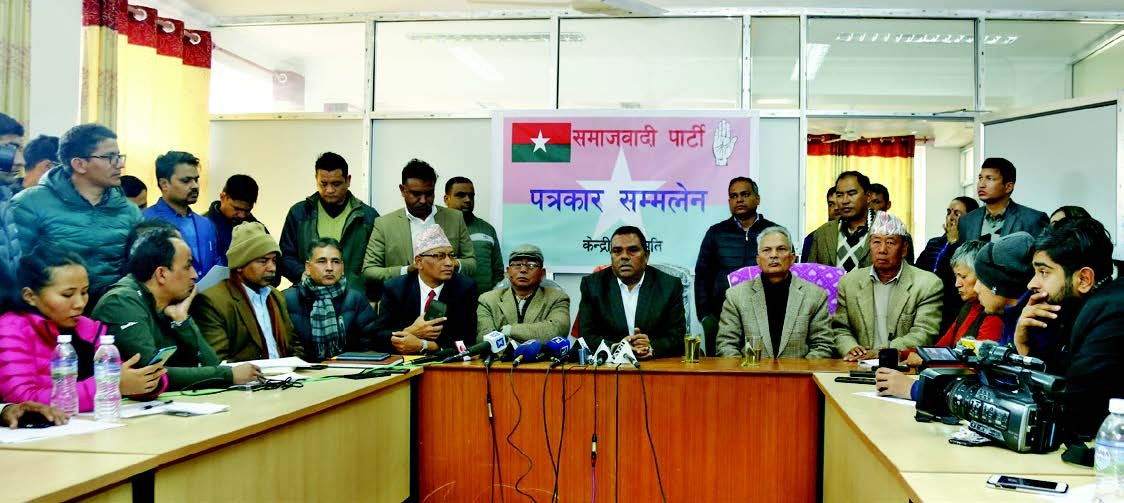Factors Behind Upendra’s exit

Federal Socialist Nepal (FSN) has formally quit the government. On the face of it, unwillingness of the Prime Minister KP Sharma Oli to amend the Constitution has been attributed as the main factor behind the FSN’s ouster from the government. But there is an undercurrent of schism and enmity that forced Upendra Yadav-led FSN to leave the government.
Yadav had joined the government with its sole agenda of the statute amendment. Yadav had first become the Deputy Prime Minister and Minister for Population and Health. In the recent reshuffle of government, he was given the Ministry of Law, Justice and Parliamentary Affairs with the DPM post. PM Oli had appointed to this post without consulting him and many had interpreted it as an insult to Yadav.
However, PM Oli was not satisfied with Yadav right from the beginning. As the important figure of the government, Yadav was supposed to defend and boost its image but he forgot the minimum norms and went on to spit venom against it that was quite unethical, apolitical and un-parliamentary. He accused the government of being indulged in corruption. By slamming the government, he was denigrating himself because he was the part of it.
After Yadav unified his party with Dr Baburam Bhattarai-led Naya Shakti, the relations between Yadav and PM Oli further went sour. Bhattarai pressed Yadav to leave the government and hit the streets against it. Yadav was sticking to the government on one or another pretext. Finally, he left it after enduring so much humiliation. Upendra was under intense moral pressure after the ruling NCP and Rastriya Janata Party, Nepal inked a two-point deal on sharing four seats of lawmakers in the National Assembly election in State 2. The two parties will each get two seats from the state. NCP-RJP accord had dealt a blow to main opposition Nepali Congress and Socialist Party as both will each lose one seat of NA.
State 2 govt under threat ?
Now speculations are rife that RJP might join the Oli government. It had withdrawn support to the Oli sometime back after its array of demands were not met but now situation has changed with Rajendra Mahato taking the mantle of the head of the party under its presidium system. The NCP-RJP deal has also endangered the SFN-led government in State 2 based on the SFN-RJP alliance. If the inconvenience marriage between the NCP and RJP does not hit the roadblocks or sails smoothly, it is likely that the State-2 government might collapse.
In order to abort the possible alliance between the NCP and RJP, Upendra Yadav announced that unification with the latter has become easy after his party quit the Oli government. RJP had demanded that Yadav must pull out of the government for the unification between the two Madhes-based forces. With Yadav’s exit from the government, it had lost the two-thirds strength in the parliament. But the changing political scenario is to unfold some dramatic moves in the days to come.
By RRS
Recent News

Do not make expressions casting dout on election: EC
14 Apr, 2022
CM Bhatta says may New Year 2079 BS inspire positive thinking
14 Apr, 2022
Three new cases, 44 recoveries in 24 hours
14 Apr, 2022
689 climbers of 84 teams so far acquire permits for climbing various peaks this spring season
14 Apr, 2022
How the rising cost of living crisis is impacting Nepal
14 Apr, 2022
US military confirms an interstellar meteor collided with Earth
14 Apr, 2022
Valneva Covid vaccine approved for use in UK
14 Apr, 2022
Chair Prachanda highlights need of unity among Maoist, Communist forces
14 Apr, 2022
Ranbir Kapoor and Alia Bhatt: Bollywood toasts star couple on wedding
14 Apr, 2022
President Bhandari confers decorations (Photo Feature)
14 Apr, 2022











